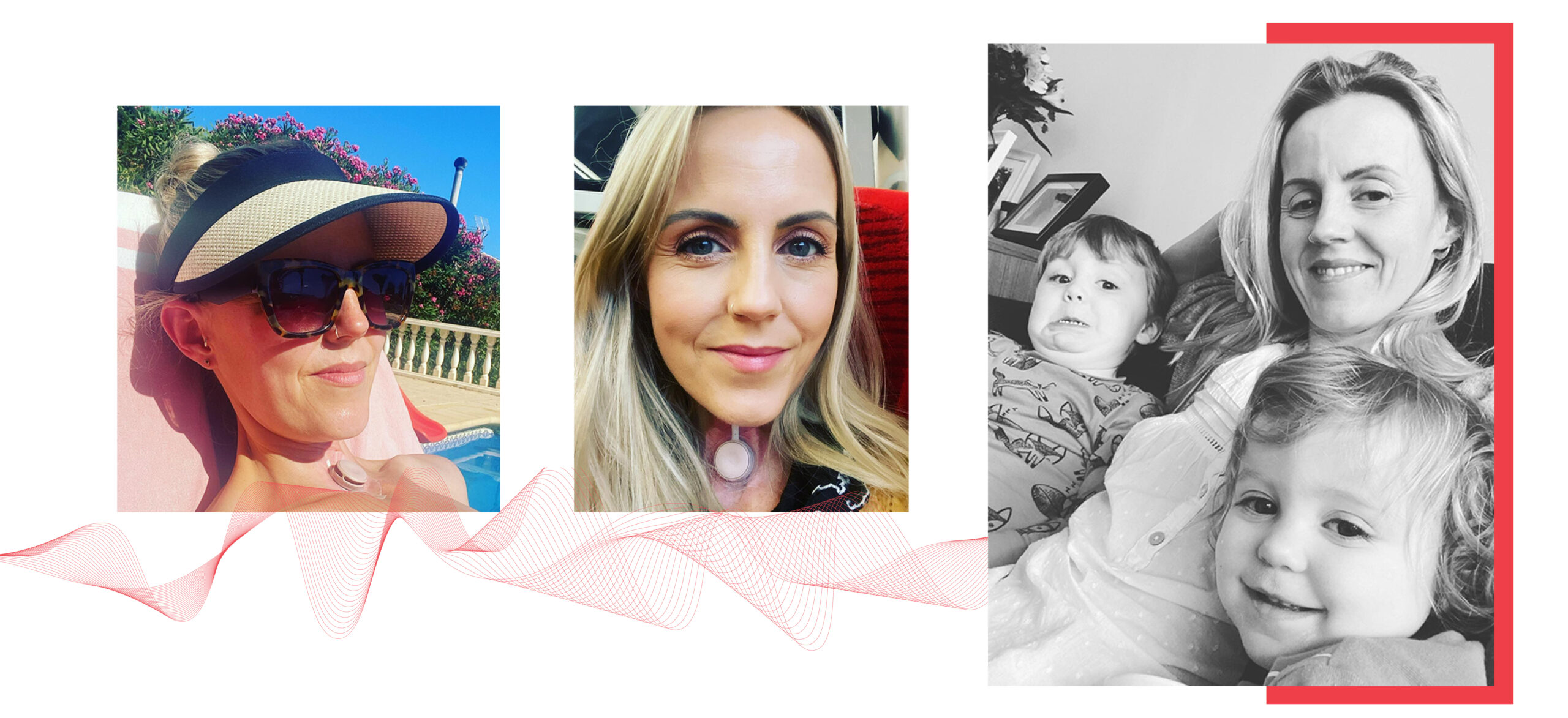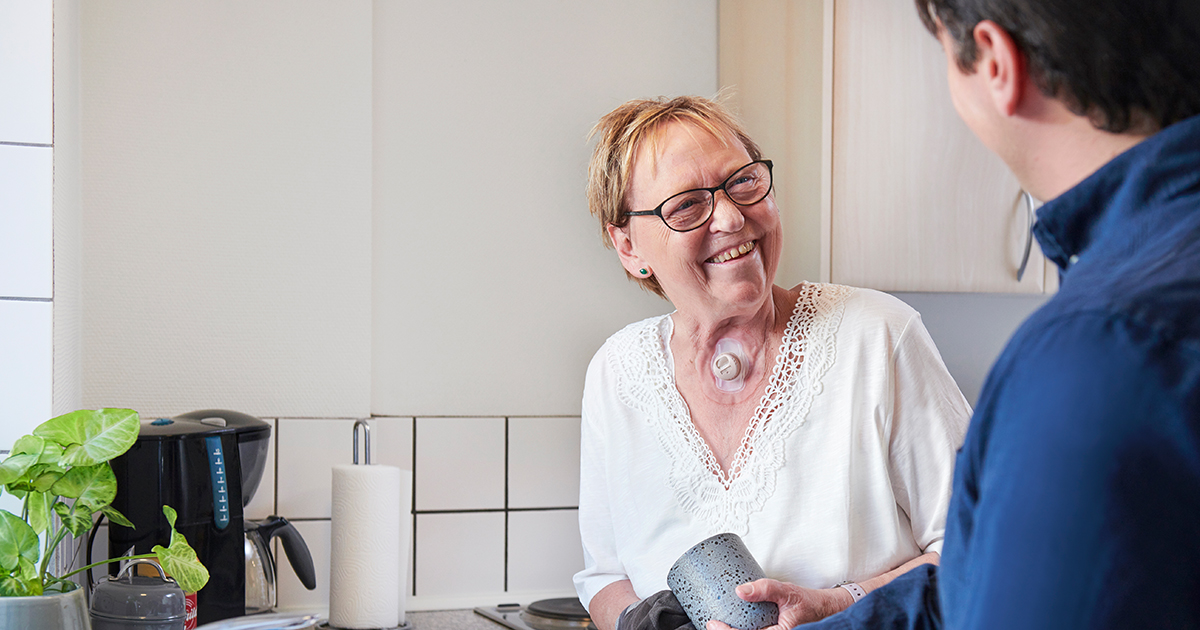A Woman’s Perspective on Living With a Laryngectomy
A Woman's Perspective on Living With a Laryngectomy
The majority of people undergoing a total laryngectomy are men over the age of 65, and this is reflected in medical research, which is typically male dominated. Despite there being a greater proportion of laryngectomized men than women, the number of laryngectomized women is rising globally. Tanja Bage is one of those women. In 2020, Tanja, a trained singer, and mother of two from the UK underwent a total laryngectomy.
This is Tanja’s story.

My name is Tanja Bage, and I was diagnosed with laryngeal cancer when I was only 38. For two years before my diagnosis, I experienced persistent symptoms of breathlessness and wheezing. While pregnant with my daughter, I visited my GP for tests and they put it down to being pregnant.
After the birth of my daughter, the symptoms never went away and despite further investigations and visits to the doctor, nothing was discovered. I think it was because I didn’t fit the usual criteria for somebody with throat cancer. Finally, towards the end of February 2020 I revisited an ENT doctor and they inserted a scope and I was immediately told: “Well we can see why you are struggling to breathe, your airway is about two millimeters wide.”
“I found it hard to look into the future and visualize myself living with this forever.”
From that point on I had CT scans that showed a large mass in my neck, which was followed quickly by a biopsy. I knew that it wasn’t going to be good news and the week before receiving my diagnosis I was absolutely terrified that there was something terribly wrong with me, that it was rare and there would be no cure. It was a very scary time.
On the day of my diagnosis, I just wanted to know the result, so I could take the next steps. It’s hard to describe the feeling after being told the result because I couldn’t possibly begin to process or accept the diagnosis. I’m sure, like most patients, I didn’t know what a laryngectomy was and it is a huge piece of news to be told the way you breathe and speak will change for the rest of your life.
I found it hard to look into the future and visualize myself living with this forever. I think some things may be easier to accept if you are told it isn’t permanent and that’s not the case with a laryngectomy.
A week after I was diagnosed, I had my surgery. So, I didn’t have much time to prepare or come to terms with what life would be like after surgery. At the time of my surgery, my son was four and my daughter was only 20 months old. We explained the surgery in simple terms to my son, that I had something wrong with my neck and I needed an operation and upon returning home my voice would be different and I would need to learn to talk again.
I have a great relationship with my speech and language therapist as well as my consultant, but it is my SLP that I interact with more often. Coming home from the hospital there was little support available and I couldn’t find a laryngectomy group in Leeds or West Yorkshire. I found forums online, connected with people on Instagram, and joined a private Facebook group for laryngectomized people in the UK. The group is a brilliant resource for support and information.
As a singer, I was thrilled to get in touch with a laryngectomy choir called ‘Shout at Cancer’ and I took part in a project with them during the pandemic but these are all support groups that I had to search for myself.
I haven’t found a support group specifically for laryngectomized women. You just naturally find other women who have been through the same experience and connect with them and because it is such a unique experience to go through I’ve made some close connections with women throughout the UK.
“Everything, for me, came back to my kids, worrying about my own mortality and wondering if my children will be left without a mother”
Having someone to talk to was important for me, and counseling really helped. Your friends and family who love and support you are not necessarily the people who will help you get over it mentally. So getting help with your mental and emotional wellbeing is essential.
I would tell others undergoing the same surgery to try not to think or worry about things that are out of your control. Focus on getting through the next hour, day or week. Be kind to yourself and don’t put too much pressure on yourself about your own recovery.
Everything, for me, came back to my kids, worrying about my own mortality and wondering if my children will be left without a mother, now or in five or ten years’ time. So, I recorded my voice because I didn’t want people to forget what I sounded like before surgery, particularly my kids.
“I think it is important my children see that having a laryngectomy doesn’t hold me back. I can still do the same things as other mothers”
For me, it was a huge loss that I can’t sing anymore, but having a laryngectomy is not stopping me from doing the things I enjoy. I still exercise, and I have been practicing yoga at home for a while because it took me a while to want to go back to a class.

I know that it is difficult to be confident after a laryngectomy and you can shy away from social situations. After a laryngectomy, you can’t eat and talk at the same time so going out for a meal with people can be difficult because you can’t join conversations in the same way.
Personally, I have not let these issues stop me from socializing but I do get nervous and anxious at times. I think having young children forces you to not become a social recluse. I still have to take them to school or to swim class and during these occasions, I will interact with other parents and I think it is important my children see that having a laryngectomy doesn’t hold me back. I can still do the same things as other mothers.
One of the issues about losing my voice as a woman is that at times I don’t feel safe because we use our voices to call for help if needed and I can’t do that anymore. I want to feel safe doing whatever I am doing and as a parent, my job is to keep them safe and I can’t shout if I need them to hear me. So I tell them to stay close when crossing a road.
When you are going through something such as cancer, there are communities of people out there that you can connect with. I set up a public page on Instagram because I wanted people to be able to find it and I hope that people who come across my page have either had a laryngectomy or know someone such as a family member who has had a laryngectomy.
Despite the occasional troll, I receive lots of very nice messages from people saying things like “My mum or my Grandma is just about to have surgery and we found your account and it has helped us and given us some hope.”
I think I have painted an honest picture on Instagram, and they can see I am just still living my life and doing normal things like camping, going on holiday, or socializing with friends.
It’s entirely possible to live a nice life after having had a laryngectomy. The physical side of it can be annoying at times but you get used to managing and dealing with the physical issues. Most of all, it is your mental and emotional health that can stop you from doing the things you want. It’s important to find someone to talk with such as a counselor or a support group so you can start to do the things that make you feel normal again.
Follow Tanja at InstagramShare
Save to my content


